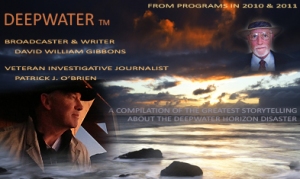July 22, 2010 – Dr. Denise Herzing Founder of the Wild Dolphin Project “The Dolphin Community “In Their World … On Their Terms”
Listen/view to program.
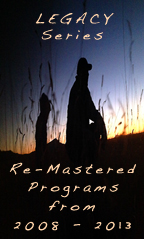 New Legacy Series – Re-Mastered Radio Streaming Broadcast: April 17, 2014 (Original Broadcast July 22, 2010)
New Legacy Series – Re-Mastered Radio Streaming Broadcast: April 17, 2014 (Original Broadcast July 22, 2010)
Dr. Denise Herzing, Research Director of the Wild Dolphin Project
“The Deepwater Horizon Human & Environmental Aftermath – Reaching for Solutions”
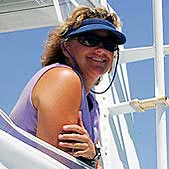 Dr. Denise Herzing, Research Director of the Wild Dolphin Project has completed 20 years of her long-term study of the Atlantic spotted dolphins inhabiting Bahamian waters. She received her B.S. in Marine Zoology from Oregon State University in 1979; her M.A. in Behavioral Biology from San Francisco State University in 1988; and her Ph.D. in Behavioral Biology/Environmental Studies from Union Graduate School, Cincinnati, Ohio in 1993. She is Research Faculty in Biological Sciences and Psychological Sciences at Florida Atlantic University, Boca Raton, Florida and Scientific Advisor to the American Cetacean Society. Dr. Herzing has authored and co-authored many papers in the fields of whale biology, animal communication and human consciousness. Coverage of her work with the spotted dolphins has appeared in National Geographic, BBC Wildlife, Ocean Realm and Sonar magazines. Her work has also been featured on the Nature series in the U.S., Discovery Channel, PBS, ABC network television, BBC in England and NHK channel in Japan. Her fields of interest are animal consciousness, behavior and communication of cetaceans, and environmental ethics. Dr. Herzing has given presentations and lectures to the following research, education and conservation organizations: Society for Marine Mammalogy, European Cetacean Society, International Fund for Animal Welfare, and others. Dr Herzing is also a Fellow of the Explorers Club.
Dr. Denise Herzing, Research Director of the Wild Dolphin Project has completed 20 years of her long-term study of the Atlantic spotted dolphins inhabiting Bahamian waters. She received her B.S. in Marine Zoology from Oregon State University in 1979; her M.A. in Behavioral Biology from San Francisco State University in 1988; and her Ph.D. in Behavioral Biology/Environmental Studies from Union Graduate School, Cincinnati, Ohio in 1993. She is Research Faculty in Biological Sciences and Psychological Sciences at Florida Atlantic University, Boca Raton, Florida and Scientific Advisor to the American Cetacean Society. Dr. Herzing has authored and co-authored many papers in the fields of whale biology, animal communication and human consciousness. Coverage of her work with the spotted dolphins has appeared in National Geographic, BBC Wildlife, Ocean Realm and Sonar magazines. Her work has also been featured on the Nature series in the U.S., Discovery Channel, PBS, ABC network television, BBC in England and NHK channel in Japan. Her fields of interest are animal consciousness, behavior and communication of cetaceans, and environmental ethics. Dr. Herzing has given presentations and lectures to the following research, education and conservation organizations: Society for Marine Mammalogy, European Cetacean Society, International Fund for Animal Welfare, and others. Dr Herzing is also a Fellow of the Explorers Club.
“The Gulf of Mexico Disaster” – The Deep Water Horizon MACADO 252 Disaster
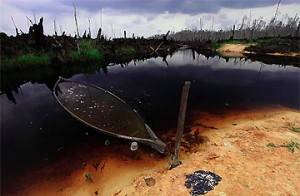 The Deepwater Horizon oil spill (also referred to as the BP oil spill, the Gulf of Mexico oil spill or the Macondo blowout) is a massive ongoing oil spill in the Gulf of Mexico, now considered the largest offshore spill in U.S. history.Some estimates placed it by late May or early June as among the largest oil spills in the world with tens of millions of gallons spilled to date. The spill stems from a sea floor 10,000 foot deep oil gusher (MC252) that followed the April 20, 2010 Deepwater Horizon drilling rig explosion. The explosion killed 11 platform workers and injured 17 others. The gusher, now estimated by the quasi-official Flow Rate Technical Group to be flowing at 20,000 to 40,000 barrels (840,000 to 1,700,000 US gallons; 3,200,000 to 6,400,000 litres) of crude oil per day, originates from a deepwater wellhead 5,000 feet (1,500 m) below the ocean surface. The exact spill flow rate is uncertain in part because BP has refused to allow independent scientists to perform accurate measurements and is a matter of ongoing debate. The resulting oil slick covers a surface area of at least 2,500 square miles (6,500 km2), with the exact size and location of the slick fluctuating from day to day depending on weather conditions.
The Deepwater Horizon oil spill (also referred to as the BP oil spill, the Gulf of Mexico oil spill or the Macondo blowout) is a massive ongoing oil spill in the Gulf of Mexico, now considered the largest offshore spill in U.S. history.Some estimates placed it by late May or early June as among the largest oil spills in the world with tens of millions of gallons spilled to date. The spill stems from a sea floor 10,000 foot deep oil gusher (MC252) that followed the April 20, 2010 Deepwater Horizon drilling rig explosion. The explosion killed 11 platform workers and injured 17 others. The gusher, now estimated by the quasi-official Flow Rate Technical Group to be flowing at 20,000 to 40,000 barrels (840,000 to 1,700,000 US gallons; 3,200,000 to 6,400,000 litres) of crude oil per day, originates from a deepwater wellhead 5,000 feet (1,500 m) below the ocean surface. The exact spill flow rate is uncertain in part because BP has refused to allow independent scientists to perform accurate measurements and is a matter of ongoing debate. The resulting oil slick covers a surface area of at least 2,500 square miles (6,500 km2), with the exact size and location of the slick fluctuating from day to day depending on weather conditions.
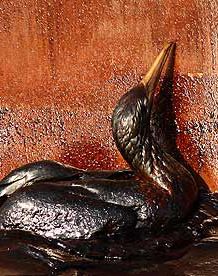 Scientists have also reported immense underwater plumes of oil not visible at the surface. Experts fear that the spill will result in an environmental disaster, with extensive impact already on marine and wildlife habitats. The spill has also damaged the Gulf of Mexico fishing and tourism industries. There have been a variety of ongoing efforts to stem the flow of oil at the wellhead. Crews have been working to protect hundreds of miles of beaches, wetlands and estuaries along the northern Gulf coast, using skimmer ships, floating containment booms, anchored barriers, and sand-filled barricades along shorelines. The U.S. Government has named BP as the responsible party in the incident, and officials have said the company will be held accountable for all cleanup costs resulting from the oil spill.
Scientists have also reported immense underwater plumes of oil not visible at the surface. Experts fear that the spill will result in an environmental disaster, with extensive impact already on marine and wildlife habitats. The spill has also damaged the Gulf of Mexico fishing and tourism industries. There have been a variety of ongoing efforts to stem the flow of oil at the wellhead. Crews have been working to protect hundreds of miles of beaches, wetlands and estuaries along the northern Gulf coast, using skimmer ships, floating containment booms, anchored barriers, and sand-filled barricades along shorelines. The U.S. Government has named BP as the responsible party in the incident, and officials have said the company will be held accountable for all cleanup costs resulting from the oil spill.
